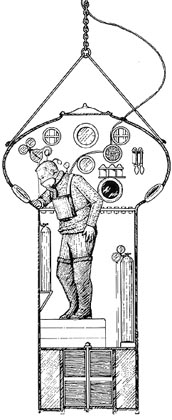This task is about understanding information from a text.
 |
Why can't you feel the weight of the air? There are several kilometres of it pressing down on you from above. Because the force of the air around you pressing in is the same as the force of the air inside you pressing out, you feel nothing. But water weighs much more than air.
Try holding a litre milk bottle of air in one hand and another full of water in the other. You can feel the difference. The weight of the air at ground level is called the weight of one atmosphere. Below ground level, under the surface of the sea, pressure increases – both air and water press on you. For about every ten metres you go down in the water, the pressure on your body goes up by the weight of one atmosphere.
|
| Most sports divers don't go down much over 20 metres – dives much beyond this are not usual. This is because, by the time divers get down to 130 metres, it's as if thirteen atmospheres were pressing down on them. At 20 metres, their rib cages would be pressed in to one-third of their normal size; at 30 metres, these would be down to one-quarter of normal. At 130 metres, if the air inside their lungs was still the same kind as they were breathing at ground level, their lungs would be squashed flat. Divers going deep down must breathe a special kind of dense air – air that is compressed to the same pressure as the water round them. | |